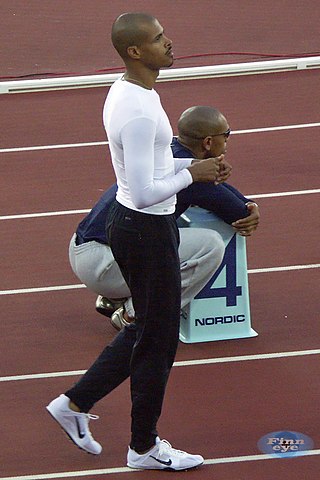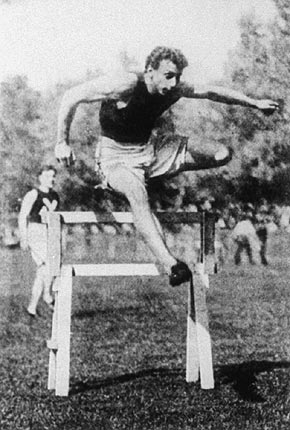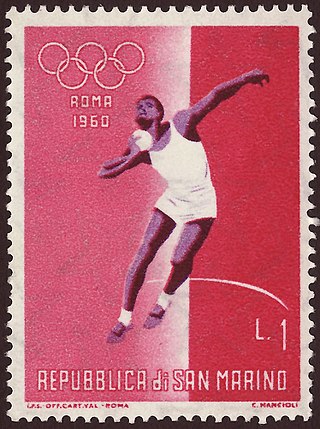
The men's 400 metres hurdles at the 2004 Summer Olympics as part of the athletics program were held at the Athens Olympic Stadium from August 23 to 26. There were 35 competitors from 24 nations. The event was won by Félix Sánchez of the Dominican Republic, the nation's first medal in the men's 400 metres hurdles. Silver went to Danny McFarlane of Jamaica, returning to the podium in the event for the first time since 1992. Naman Keïta's bronze was France's first medal in the event in over 100 years; the last Frenchman to medal in the long hurdles was Henri Tauzin in 1900. The United States' five-Games gold medal streak ended; for only the second time in the history of the event, Americans competed but won no medals.

The men's 400 metres hurdles was the longer of two hurdling events at the 1908 Summer Olympics in London. It was the third time the event had been featured at the Olympics. The Olympic record was beat three times in the course of the Games. The competition was held from Monday, July 20, 1908, to Wednesday, July 22, 1908. 15 runners from six nations competed. NOCs could enter up to 12 athletes. The event was won by Charles Bacon of the United States, defeating teammate and defending champion Harry Hillman by 0.3 seconds in the final. It was the third gold medal in three Games for the American team in the event. Hillman was the first man to earn multiple medals in the 400 metres hurdles. Jimmy Tremeer of Great Britain earned bronze, the first medal for the nation in the men's 400 metres hurdles.

The men's 60 metres was the shortest of the track races at the 1900 Summer Olympics in Paris, which was the first time the event was held. It was held on 15 July 1900. 10 athletes from 6 nations competed. Five preliminary heats were scheduled, though only two were actually held. The top two athletes from each of the heats advanced to the final, resulting in a final race that featured three United States runners and an Australian. Hurdle specialist Alvin Kraenzlein of the United States won the event, with his countryman Walter Tewksbury in second and Australian Stan Rowley earning bronze.

The men's 110 metres hurdles was the first of the track and field events on the athletics programme at the 1900 Summer Olympics in Paris. It was held on July 14, 1900. Nine athletes from three nations competed in the shortest of the hurdling events. The event was won by Alvin Kraenzlein of the United States, the second of five consecutive victories for the nation in the first five Olympic Games. It was also the first of four consecutive podium sweeps for the Americans in the event.

The men's 200 metres hurdles was a hurdling event on the athletics programme at the 1900 Summer Olympics in Paris. It was held on July 16, 1900. 11 athletes from five nations competed in the middle of the three hurdling events. The event was won by Alvin Kraenzlein of the United States, earning his fourth individual gold in athletics in one Games—a record that still stands as of the 2016 Games. The silver medal went to Norman Pritchard of India, while another American earned bronze.

The men's 400 metres hurdles was a track & field athletics event at the 1900 Summer Olympics in Paris. This event was held for the first time at the Olympics. The competition took part on July 14 and July 15, 1900. The race was held on a track of 500 metres in circumference. Five athletes from four nations competed in the longest of the three hurdling events. The event was won by Walter Tewksbury of the United States. Henri Tauzin of France earned silver, while George Orton of Canada took bronze.

The men's 60 metres was a track and field athletics event held as part of the Athletics at the 1904 Summer Olympics programme. It was the second and last time the event was held at the Olympics. 12 athletes from 3 nations participated. The competition was held on August 29, 1904. The event was won by Archie Hahn of the United States, with William Hogenson second and Clyde Blair third as the host nation swept the medals. It was the first of three gold medals in the sprints won by Hahn in 1904.

The men's 400 metres was a track and field athletics event held as part of the Athletics at the 1904 Summer Olympics programme. It was the third time the event was held. 12 athletes from 3 nations participated. The competition was held on August 29, 1904. The event was won by Harry Hillman of the United States, the third time in a row that a different American had won the event. The Americans swept the medals, the first time that feat had been achieved in the men's 400 metres.

The men's 110 metres hurdles was a track and field athletics event held as part of the Athletics at the 1904 Summer Olympics programme. It was the third time the event was held. 6 hurdlers from 2 nations participated. The competition was held on September 3, 1904. The event was won by Frederick Schule of the United States, the third of five consecutive victories for the nation in the first five Olympic Games. It was also the second of four consecutive podium sweeps for the Americans in the event.

The men's 400 metres hurdles was a track and field athletics event held as part of the Athletics at the 1904 Summer Olympics programme. It was the second time the event was held. Four athletes from the United States participated. The competition was held on August 31, 1904. The event was won by Harry Hillman, with Frank Waller taking silver and George Poage bronze.

The men's 400 metres hurdles at the 1988 Summer Olympics in Seoul, South Korea had an entry list of 38 competitors, with five qualifying heats and two semifinals (16) before the final (8) took place on Sunday September 25, 1988. One athlete did not start, so there were 37 competitors from 28 nations. The maximum number of athletes per nation had been set at 3 since the 1930 Olympic Congress. The event was won by Andre Phillips of the United States, the nation's second consecutive and 14th overall victory in the event. Amadou Dia Ba earned Senegal's first medal in the event with his silver. Dia Ba broke up a potential American sweep, as 1976 and 1984 champion Edwin Moses took bronze and Kevin Young placed fourth. Moses was the second man to earn three medals in the event.

The men's 400 metres hurdles event was part of the track and field athletics programme at the 1920 Summer Olympics. The competition was held on Sunday, August 15, 1920, and on Monday, August 16, 1920. 19 runners from 9 nations competed. Nations were limited to 4 hurdlers each. The event was won by Frank Loomis of the United States, the fourth consecutive victory by an American. The United States secured its second sweep in the event, and first with other nations competing, with John Norton taking silver and August Desch bronze.

The men's 400 metres hurdles event was part of the track and field athletics programme at the 1924 Summer Olympics. The competition was held on Sunday, July 6, 1924, and on Monday, July 7, 1924. Twenty-three hurdlers from 13 nations competed. The maximum number of athletes per nation was 4. The event was won by Morgan Taylor of the United States, the fifth consecutive victory by an American in the event. Erik Wilén received silver, Finland's first medal in the men's 400 metres hurdles. Another American, Ivan Riley, took bronze.

The men's 400 metres hurdles at the 1980 Summer Olympics in Moscow, Soviet Union had a start list of 22 competitors from 19 nations, with three quarterfinals, two semifinals (16), and a final (8) that took place on Saturday July 26, 1980. The maximum number of athletes per nation had been set at 3 since the 1930 Olympic Congress. The event was won by Volker Beck of East Germany, the nation's first medal in the event. Vasyl Arkhypenko earned silver, the second consecutive Games that the Soviet Union reached the podium in the event. Gary Oakes put Great Britain back on the podium after a one-Games absence with his bronze.

The men's 400 metres hurdles event at the 1932 Olympic Games took place on July 31 and August 1 at the Los Angeles Memorial Coliseum. There were 18 competitors from 13 nations. The 1930 Olympic Congress in Berlin had reduced the limit from 4 athletes per NOC to 3 athletes. The event was won by Bob Tisdall of Ireland, the nation's first medal in the event in its 400 metres hurdles debut. The United States took silver and bronze, extending its streak of taking at least silver in all 7 appearances of the event to that point. Taylor became the first man to earn three medals in the event, adding to his 1924 gold and 1928 bronze. Defending champion David Burghley of Great Britain finished fourth.

The men's 400 metres hurdles event at the 1960 Olympic Games took place between August 31 and September 2. There were 34 competitors from 23 nations. The maximum number of athletes per nation had been set at 3 since the 1930 Olympic Congress. The event was won by Glenn Davis of the United States, the first man to successfully defend an Olympic title in the 400 metres hurdles. As of the 2016 Games, he remains the only man to do so; three others have won two gold medals in the event, but all three did so in nonconsecutive Games. It was the United States' fifth consecutive and 10th overall victory in the event. The Americans also completed their second consecutive medal sweep in the event, as Cliff Cushman took silver and Dick Howard took bronze.

The men's 400 metres hurdles was an event at the 1976 Summer Olympics in Montreal. The competition was held from July 23, 1976, to July 25, 1976. There were 22 competitors from 16 nations. The maximum number of athletes per nation had been set at 3 since the 1930 Olympic Congress. American Edwin Moses won the final in a world record and Olympic record time of 47.64 seconds, winning by 1.05 seconds. His time was initially noted as one hundredth slower, but this was rounded up after an analysis of the photo finish. It was the United States' first victory in the event since 1964 and 12th overall. Fellow American Michael Shine took silver. Yevgeniy Gavrilenko earned the Soviet Union's first medal in the event since 1952 with his bronze. Great Britain's three-Games podium streak in the event ended.
The men's 400 metres hurdles competition at the 1956 Summer Olympics in Melbourne, Australia took place on November 23–24 at the Melbourne Cricket Ground. There were 28 competitors from 18 nations. The maximum number of athletes per nation had been set at 3 since the 1930 Olympic Congress. The event was won by Glenn Davis of the United States, the nation's fourth consecutive and ninth overall victory in the men's 400 metres hurdles. Eddie Southern (silver) and Josh Culbreath (bronze) completed the American sweep, the third time that the United States had swept the medals in the event.

The 400 metres at the Summer Olympics has been contested since the first edition of the multi-sport event. The men's 400 m has been present on the Olympic athletics programme since 1896 but nearly seventy years passed before the introduction of the women's 400 m, which has been held continuously since the 1964 Games. It is the most prestigious 400 m race at elite level. The competition format typically has two qualifying rounds leading to a final race between eight athletes.

The sprint hurdles at the Summer Olympics have been contested over a variety of distances at the multi-sport event. The men's 110 metres hurdles has been present on the Olympic athletics programme since the first edition in 1896. A men's 200 metres hurdles was also briefly held, from 1900 to 1904. The first women's sprint hurdling event was added to the programme at the 1932 Olympics in the form of the 80 metres hurdles. At the 1972 Games the women's distance was extended to the 100 metres hurdles, which is the current international standard.


















